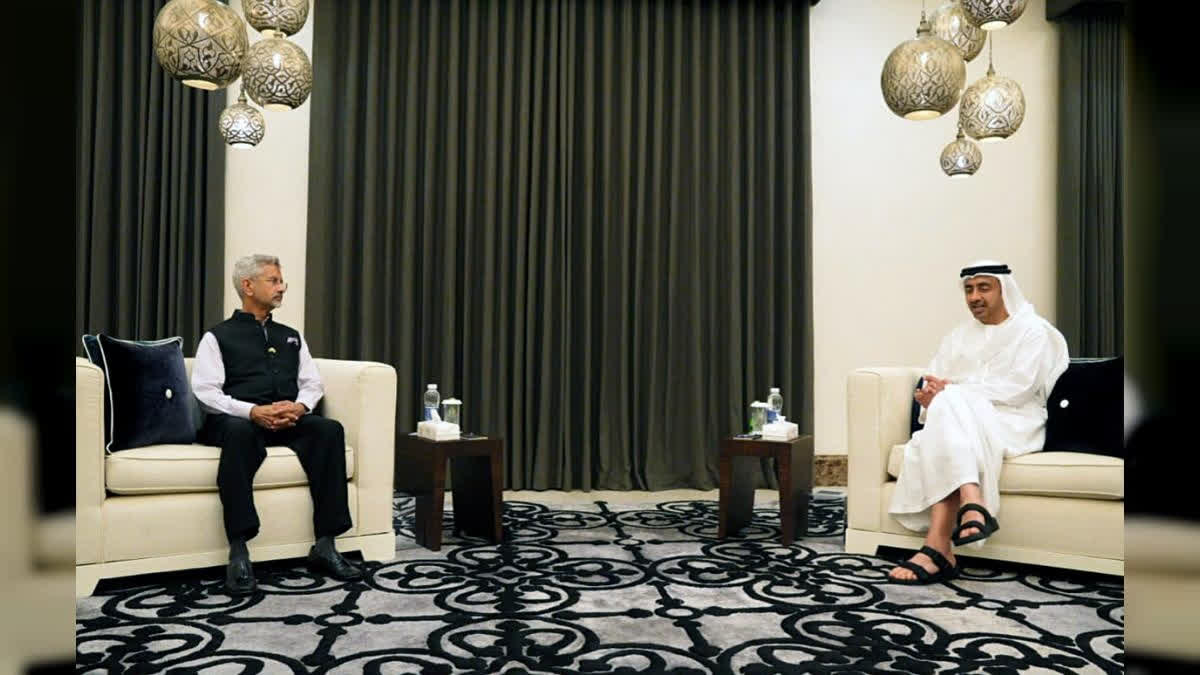New Delhi: Amid a flurry of diplomatic dialogues between India and key officials from West Asia prompted by escalating tensions in the Middle East, the Deputy Prime Minister and Minister of Foreign Affairs of the United Arab Emirates Sheikh Abdullah Bin Zayed Al Nahyan has touched down in New Delhi late on Wednesday night. The UAE official engagements here till Dec 13.
His visit comes at a time the Syrian government is undergoing a transition after armed rebels ousted president Bashar al-Assad.
Experts say Al Nahyan's visit will enhance the vital role India plays in fostering dialogue and cooperation in a region marked by strife.
He will call on Prime Minister Narendra Modi and External Affairs Minister S Jaishankar to discuss and review the entire gamut of the comprehensive strategic partnership. The West Asia crisis and other global and regional issues of mutual interest top the agenda of discussion. Both sides are also scheduled to hold the India-UAE strategic dialogue on Dec. 12 and Joint Commission Meeting the next day.
In conversation with ETV Bharat, former ambassador of India to Qatar, Kalarickal Pranchu Fabian said, "The visit of the Deputy PM and Foreign Minister of UAE is significant because the UAE stands as a pivotal player in the geopolitical landscape, especially within its region. The multidimensional relationship between the UAE and India has been flourishing, and this visit is key to further strengthening those ties. While the specifics of the discussions remain unclear, one critical area that warrants attention is the Syrian crisis."
Furthermore, India's former Ambassador to Libya and Jordan, Anil Trigunayat, who has experience in the Economic, West Asia, North Africa, and Consular Divisions of the Ministry of External Affairs, highlighted the strategic and unique nature of the India-UAE relationship.
He noted that the UAE plays a significant role in this partnership. In recent years, India and the UAE have collaborated on various sub-regional and regional initiatives, such as I2U2 and IMEC. Additionally, they recently held a high-level committee meeting. With the ongoing deterioration of the regional situation, Trigunayat emphasised the importance of maintaining frequent and regular interactions with key regional partners. He affirmed that India advocates for dialogue, diplomacy, and stability in West Asia, working in concert with its strategic partners in the region.
The visit indicates the rapid diplomatic discussions currently underway between India and the major powers in the conflict-ridden West Asian region. . Jaishankar paid an official visit to the UAE on 14 November this year. This was his tenth visit to the UAE since 2019. The EAM met his counterpart HH Abdullah Bin Zayed Al Nahyan, Deputy Prime Minister and Foreign Minister of UAE. They reviewed the entire gamut of the comprehensive strategic partnership. Jaishankar expressed satisfaction over the continuous exchange of high-level visits and the exponential growth in the relationship. They also discussed the regional and global issues of mutual interest. During his visit, EAM extended an invitation to Abdullah Bin Zayed Al Nahyan to visit India.
The UAE stands as India's third largest trading partner and the second most significant destination for its exports, while also being one of the top ten investors in India. In 2022, both nations took a significant step forward by signing a Comprehensive Economic Partnership Agreement (CEPA), with the ambitious goal of reaching $100 billion in non-oil trade by 2030.
The India-UAE partnership in the West Asia region has become increasingly important in recent years, driven by shared economic, political, and strategic interests. The relationship between the two countries spans various sectors, including trade, energy, defence, technology, and geopolitics.
Commenting on the Syria crisis, Fabian said, "The departure of Bashar al-Assad marks a positive shift; he was fundamentally isolated by his absolute power, bolstered by military support from Iran and Russia, which prevented any meaningful dialogue with opposition voices."
"Currently, Mohammed Jilani's rule in Idlib—a governorate bordering Turkey—over the past four years has shown that governance can be effective even amid turmoil. With a population of approximately three to four million, Idlib has seen progress under his leadership, such as allowing girls access to education, setting it apart from the Taliban's oppressive regime. While optimism is prudent, we must exercise caution to avoid the pitfalls experienced in Afghanistan. In the diplomatic arena, the rule of engaging with those who hold power is essential, regardless of personal sentiments toward their governance. India should take the initiative in the Global South context and consider organising an international conference aimed at Syria's reconstruction when the time is right," added Fabian.
"The national security of India is closely linked to the stability of the Gulf region, especially with the substantial Indian diaspora there, which underscores the urgent need for peace and stability to protect our interests, particularly in energy security. Moreover, as India evolves from a Look West to an Act West policy, a broadening focus on all regional players, not just the UAE and Saudi Arabia, is crucial. Missed diplomatic opportunities, such as failing to invite Iraq and Iran during the G20, should serve as lessons moving forward," he added.
The ex-diplomat said that the strategic partnership with the UAE hinges on strong defence cooperation and innovative financial arrangements and to maximise this relationship, there is a pressing need to deepen engagement in higher education.
"Ultimately, India's potential role as a mediator in various Middle Eastern conflicts can leverage its solid relationships. The country can discreetly advise allies like Israel to pursue more peaceful approaches, aiming to halt hostilities and foster regional stability. The forthcoming India-UAE strategic dialogue is a critical juncture that should address these pressing concerns and develop a comprehensive action plan that benefits not just our nations, but the broader region," concluded Fabian.



